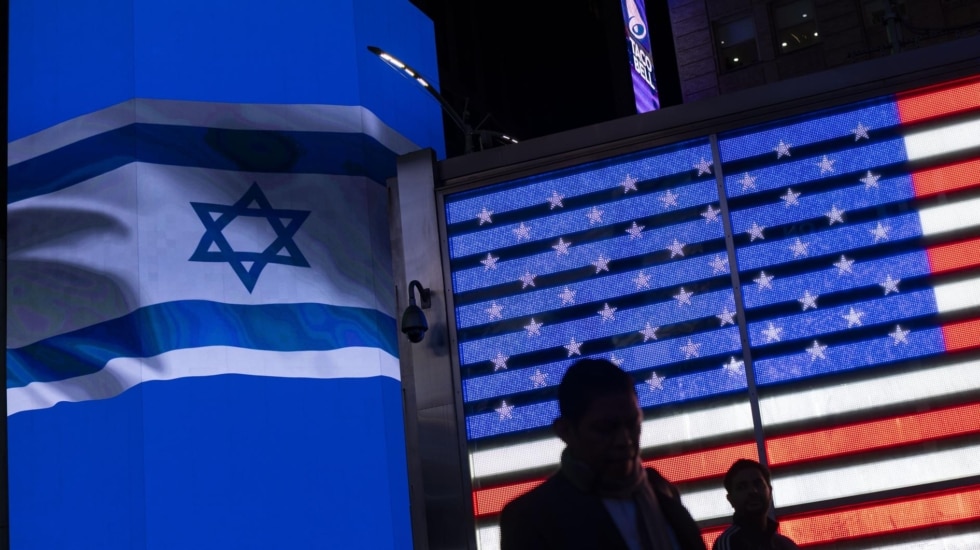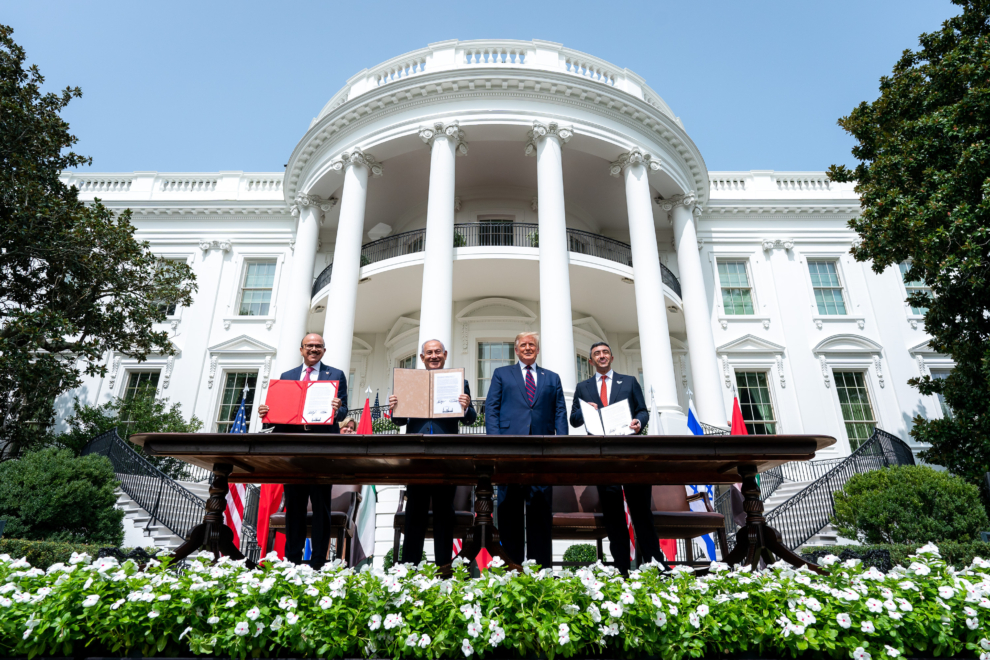

A group of people walk past a billboard with an Israeli flag displayed to mark a rally in support of Israel in Times Square, New York, USA, October 19, 2023.
Days pass Joe Biden clarified his speech about the war between Hamas and Israel. While he initially gave the Israeli green light to act, in recent days he has also expressed concern about the delivery of humanitarian aid to the sector, while ensuring that the humanity of innocent Palestinians cannot be “ignored.” But no one doubts that the United States supports and will support Israel. Because this is exactly what has been happening for the last 75 years.
A few days ago, Carlota García Encina, chief scientist at the Royal Elcano Institute, raised precisely this issue during a debate organized by the institution itself. “The US is Israel’s great historical ally. This is the country that supported him the most. militarily and politically, and both American Democrats and Republicans defend this relationship. But both are sovereign states. The US does not determine Israel’s policies or foreign policy. This doesn’t force anything on you. Although it is true that Israel is interested in maintaining these good relations,” Garcia explains in a conversation with Independent.
The relationship began in 1948., when Harry S. Truman, then the American president, became the first world leader to recognize the Jewish state after its creation. Something that Garcia believes is due to the sense of “guilt” that the American country felt after World War II and the Holocaust.
The link where All US Presidents throughout history have actively participated, lasts until today. Although it went through different stages, American support intensified during the Cold War. And this was done with two clear goals: to prevent the conflict from spreading further and to ensure that the newly born Jewish state had military capabilities on par with neighboring countries.
military support
On the military level, Garcia elaborates, the US has a foreign financing program that has been providing money to Israel for “decades,” although it is evolving. This aid currently amounts to $3.8 billion annually for the Jewish state. And it can be said without a doubt that the American country has fulfilled its task, since Israel was able to “transform its armed forces” and maintain this “qualitative advantage” over all its neighbors thanks to modern weapons.
This funding package does not include money the United States has committed to Iron Dome, one of Israel’s missile defense systems, which the network CNBC I appreciated it was almost 3 billion dollars more before the Hamas attack on October 7
These financial amounts are set in a so-called MOU (Memorandum of Understanding). The latter was signed in September 2016 and is valid for 10 years. Which means that until then the conditions will not changeand that the next Memorandum of Understanding must be agreed upon by the candidate who wins the November 2024 US election.
Garcia explains how agreements between both countries also allowed Israel to receive preferential treatment: “The US Foreign Military Financing Program obliges countries that receive money to use it exclusively to purchase American weapons. Israel is an exception, since 26% of the budget can be allocated to its own industry., which explains why it is currently so powerful. However, when this Memorandum ends, these terms will have to be reconsidered.”
Political support
Since Truman, every US president has been involved in one way or another with Israel, be it through wars, crises or peace agreements (though the last two, Donald Trump and Joe Biden, deserve their own chapter). Garcia believes that Historically, the United States has always tried to act as a “mediator” in Israeli conflictsalthough, apparently, friendship prevented them from acting neutrally.
Here are the main issues that have concerned various American presidents in relations with Israel since the creation of the Jewish state in 1948:
- Dwight D. Eisenhower (1953-1961): Suez Canal Crisis (1956).
- John F. Kennedy (1961-1963): Expressed great concern about Israel’s ambitions to develop nuclear weapons. He even asked inspectors from the International Atomic Energy Agency to monitor the country.
- Lyndon B. Johnson (1963-1969): Six Day War (1967).
- Richard Nixon (1969-1974): Yom Kippur War (1973) and Oil Crisis (1973).
- Gerald Ford (1974-1977): Lebanese Civil War (1975).
- Jimmy Carter (1977-1981): Camp David Accords (1978).
- Ronald Reagan (1981–1989): “Violent” support for Israel, sending soldiers to Lebanon and bombing Beirut.
- George H. W. Bush (1989–1993): Madrid Peace Conference (1991).
- Bill Clinton (1993–2001): Oslo Accords (1993). For Garcia, this may have been the moment peace came closest to being achieved.
- George Bush (2001-2009): His global war on terrorism has sidelined the conflict between Israel and Palestine. However, in 2005, he helped persuade Ariel Sharon, the Israeli prime minister, to withdraw his troops from the Gaza Strip. The following year, Hamas won elections in the Gaza Strip and gained power, which it still retains.
- Barack Obama (2009–2017): He was very critical of the Israeli occupation of the West Bank and had a rather bad relationship with Netanyahu. He campaigned for Palestinian rights.
Trump’s turn and Biden’s policies
The Trump presidency (2017-2021) broke everything because the US stopped trying to mediate. “He positioned himself radically in favor of Israel. He didn’t even bother to talk to the rest of the cast. This can be seen in the Abraham Accords (2020) and the recognition of Israel’s annexation of Jerusalem and the Golan Heights. And he moved the US embassy to Jerusalem,” Garcia says, pointing out that the then-president’s son-in-law, Jared Kushner, a Jewish senior White House official, may have had a lot to do with it. .

“Biden has not reversed any of Trump’s controversial decisions. although it is true that this is not easy to do. From the very beginning he spoke of finding a diplomatic solution, but did not begin direct negotiations. He was very careful, undoubtedly much more than what was required of him in his own party. But for him this conflict was never a priority. “His idea was to contain it so the situation wouldn’t get worse, but he didn’t pay much attention to it,” the expert says.
But Biden’s case is also special because he has a personal relationship with Netanyahu. since he worked in the 80s at the Israeli Embassy in Washington, where they developed a certain friendship. When Netanyahu was defeated in the 1999 election after ruling Israel, Biden wrote him a very affectionate letter, for which the Israeli president thanked him. And during the presidency of Obama, who, as explained above, had a very poor relationship with Netanyahu, Biden served as a liaison between both governments.
“This says a lot about Biden because One of the pillars of foreign policy is personal relationships. That is why he went to Israel these days. reduce tensions, help free Hamas hostages and ensure Gaza receives humanitarian aid,” Garcia says. In her opinion, the US President has partially completed his first task, the second is too early to know, and the third will depend more on neighboring countries. Israel than the Jewish state itself.
Future
Over the past year and a half, something different has been brewing in the United States. There are already many voices, both liberal and conservative, who They question whether the American country should continue to support Israel in this way.. And this is new. The most progressive believe that the United States is helping to undermine Palestinian rights. Conservatives argue that American aid is not helping Netanyahu achieve his strategic goals. And those who find themselves somewhere in the middle simply believe that Israel can handle it on its own.
Added to this is the US’s historically difficult relationship with the Middle East and the loss of interest North American leaders have shown since the turn of the century. Lately, Garcia says, many Americans are viewing the region as a place very connected to terrorism and with no future. A very negative vision, which, as he explains, Biden has recently tried to change. But the new conflict between Israel and Hamas does not seem to be helping in this regard.
US geopolitical priorities
Although the escalation of tensions and attacks forced the United States to once again pay attention to the Middle East.Garcia is convinced that the country’s priorities are different. In order: China, its main geopolitical rival around the world, and the Ukrainian war, which is fundamental to its interests.
And there is one more important question. The US House of Representatives, which is responsible for approving funds for any project, is blocked because it does not have any at the moment. speaker. And there are already some members of the Republican Party who are against continued financial assistance to Ukraine. Something that The same thing could happen to Israel if this conflict drags on for a long time. Another problem for the White House.
However, a researcher at the Royal Institute Elcano doesn’t think the war between Hamas and Israel will matter in the US elections next year because “international politics is never like this.” On the other hand, he believes that the key will be who becomes Israel’s next prime minister. “Netanyahu is politically finished. There is a great internal division in Israel. And if someone more moderate comes to power, he will be favorable towards relations with Washington,” he concludes.
Source: El Independiente